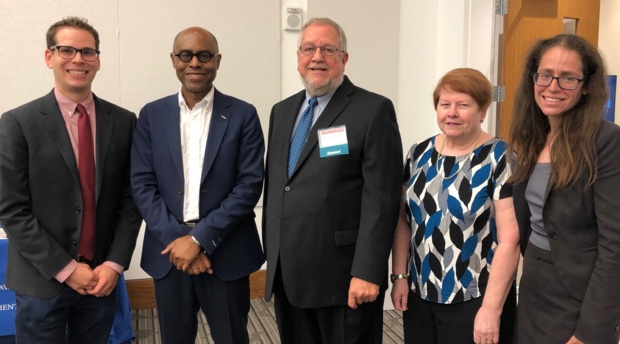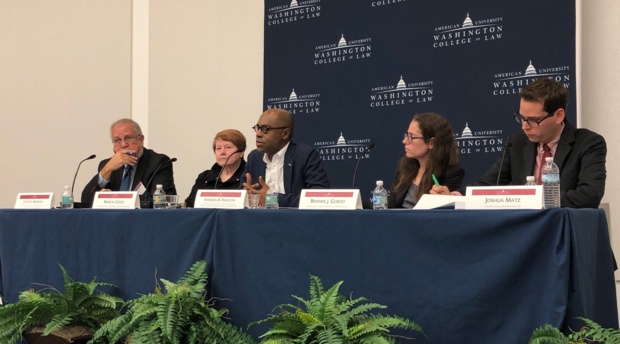AUWCL Hosts “On the Docket: Looking Ahead at the New Supreme Court Term”
Sept. 25, 2019

On Wednesday, Sept. 25, American University Washington College of Law hosted an in-depth panel discussion covering key issues the U.S. Supreme Court will address when its new term commences on Oct. 7.
AUWCL Professor and Supreme Court expert Steve Wermiel moderated “On the Docket: Looking Ahead at the New Supreme Court Term,” presented by the law school’s Program on Law and Government and the ABA Division for Public Education. Nearly 100 students, faculty, staff, and community members attended the annual event, which has been held for more than 20 years.
Panelists included Maria Coyle, chief Washington correspondent at National Law Journal; Aderson B. Francois, professor of law and director of the Institute for Public Representation Civil Rights Law Clinic at Georgetown Law; Brianne J. Gorod, chief counsel at the Constitutional Accountability Center; and Joshua Matz, counsel at Kaplan Hecker & Fink LL.
“With the arrival of Justice Kavanagh and the retirement of Justice Kennedy, there is a possibility of a solid five-member working conservative majority, which the Roberts’ Court hadn’t had in any kind of predictable way up until this point – or certainly not as predictable as it may be now,” Wermiel said during his welcoming remarks.

Panelists discussed a number of topics that will go before the court, including whether the Justices may use a New York City case to expand gun rights; whether Kansas has unconstitutionally abolished an inmate’s right to use insanity as a defense for murder; and whether the federal law barring employment discrimination includes bias based on sexual orientation or gender identity.
Matz discussed how the Court is preparing to hear arguments questioning if the federal law that prohibits workplace discrimination—Title VII of the Civil Rights Act of 1964—applies to discrimination on the basis of such orientations and identities.
“For a long time, the prevailing unanimous view of the courts and other authorities who considered this question was that answer is ‘no.’ But over the past few years, that’s started to change,” Matz said. “The Justices are (taking these cases) at a time where the societal understanding of gay, lesbian, and bisexual people and trans people has changed in very dramatic ways…A ruling in favor of protection here would have wonderful benefits and protections for people who deserve them and need them as a policy matter, and who I believe are entitled to them as a matter of law.”
Gorod discussed another hot-button issue headed before the Court: whether President Trump had the authority to repeal the Deferred Action for Childhood Arrivals (DACA) immigration program.
“We’ve repeatedly heard the president suggesting he has the Supreme Court in his back pocket; that he can count on the Court to roll his way when lower courts have not,” Gorod said. “One test of that was last year in the census case, when the Court rejected the Trump administration’s effort to put a citizenship question on the census. I think (the forthcoming DACA case) will be the next big test, whether the Supreme Court will stand up and serve as a check on the executive branch as it attempts to engage in illegal action.”
Watch a video of the panel here.